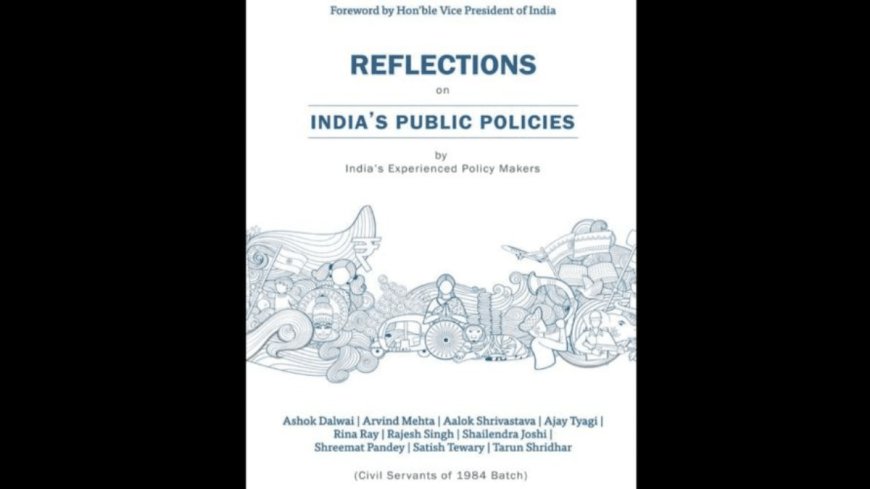Experienced Policy Makers Present ‘Reflections on India’s Public Policies’ to Shape the Nation’s Future!
20th May 2023, Mumbai: Reflections on India’s Public Policies’ is a remarkable collaborative effort by a group of ten seasoned policy-makers from the 1984 batch. With a combined experience of ove...

20th May 2023, Mumbai: Reflections on India’s Public Policies’ is a remarkable collaborative effort by a group of ten seasoned policy-makers from the 1984 batch. With a combined experience of over three centuries in shaping the future of our nation, these policymakers delve into various crucial aspects that contribute to the growth of a country, including Finance, Land Usage, Education, Health, Sustainable Development, and Energy. What sets this treatise apart is its positive and forward-thinking approach. While it identifies pressing issues faced by India, it goes beyond dwelling on the problems and offers practical and effective solutions supported by hard evidence.
This book stands out from others in the domain of public policy as it provides an objective analysis based on practical experiences rather than personal memoirs, which are more commonly shared by civil servants in India. Recognizing that over 50% of the Indian population still depends on the primary sector, the book extensively covers agriculture and related subjects such as animal husbandry, fisheries, poultry, dairying, and rural industrialization. It pays significant attention to conserving soil, land, and water resources while also addressing important social aspects like preventing food loss and wastage.
A key takeaway from the book is the need for various forms of water harvesting structures throughout the country. It emphasises that both small-scale and large-scale water conservation efforts are essential, highlighting the importance of water security as a fundamental requirement and justifiable investment for a basic public good. Regarding agriculture, the book clearly highlights the detrimental impact of inefficient subsidies, which stifle entrepreneurial spirit, as the recovery of input costs has already been addressed. In contrast, it points out that dairying, poultry, and fish farmers must work harder to recover costs and generate a surplus to sustain their operations. Furthermore, the book emphasises that the current agricultural policies discourage innovation by removing the incentive to perform better.
Agro-based rural industrialization presents a valuable opportunity to address the surplus agricultural labour force. Establishing a comprehensive land use policy for the country becomes crucial in this regard. The authors assert that for India to fully capitalise on its demographic dividends, a robust public finance policy must prioritise education and health, which are of universal importance. They advocate that any amount of expenditure on health and education, both at the central and state levels, is beneficial. To ensure the competitiveness of higher and technical education in India, the authors recommend aligning the curriculum and teaching methods with global market demands. This may involve assessing the demand-supply gap and introducing necessary modifications. As foreign universities and professional institutions express interest in India, the authors suggest planning the establishment of additional higher education institutions. They also propose maintaining reasonable education costs from kindergarten to advanced specialisations, thereby reducing the need for Indian students to pursue education abroad.
Making education and health services available, accessible, and affordable for all is a crucial objective. The authors emphasise the importance of an efficient regulatory framework for the medical and education sectors. This regulator should operate independently from the state and central governments to create a level playing field for both publicly and privately funded institutions. The regulatory approach should be lightweight, avoiding excessive prescription and favouring self-certification procedures, while maintaining a “trust, but verify” mantra with a risk-based assessment mechanism. In the energy sector, reconciling long-term commitments in conventional energy with the rapid growth of renewable energy is necessary. The current efforts to revitalise utilities in the energy sector are insufficient to ensure their long-term viability.
A notable comparison between service delivery systems in India and the USA reveals that political interference in India’s day-to-day administration negatively impacts services. Both elected and selected representatives share responsibility for this situation. Contrary to popular belief, India’s per capita expenditure on administration is relatively low. Despite various constraints, the Indian system manages to provide quality services to citizens, although there is room for improvement. The book also highlights the importance of “Market Discipline” in fostering growth in capital markets and guiding banks’ responses for the overall benefit of India’s economy. To meet India’s growth aspirations, developing a deep and dynamic corporate bond market is essential. In summary, ‘Reflections on India’s Public Policies’ is a highly recommended read for aspiring and current civil servants, academics, enlightened politicians, and anyone interested in India’s well-being and sustainable development.
What's Your Reaction?











































